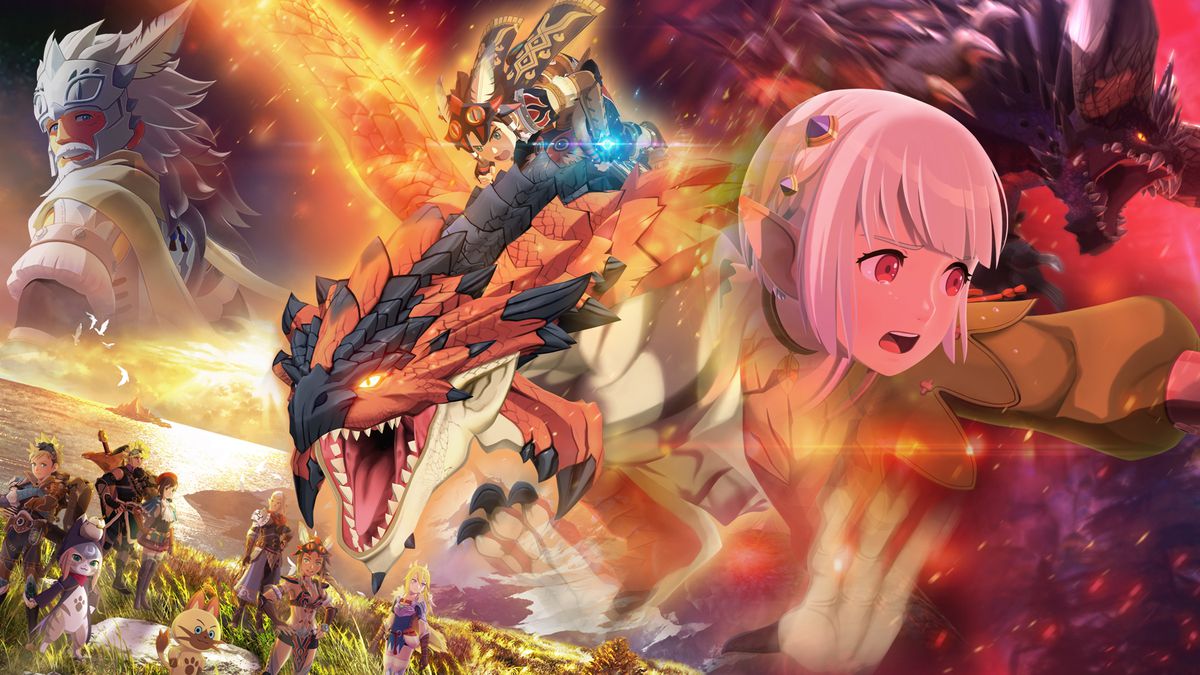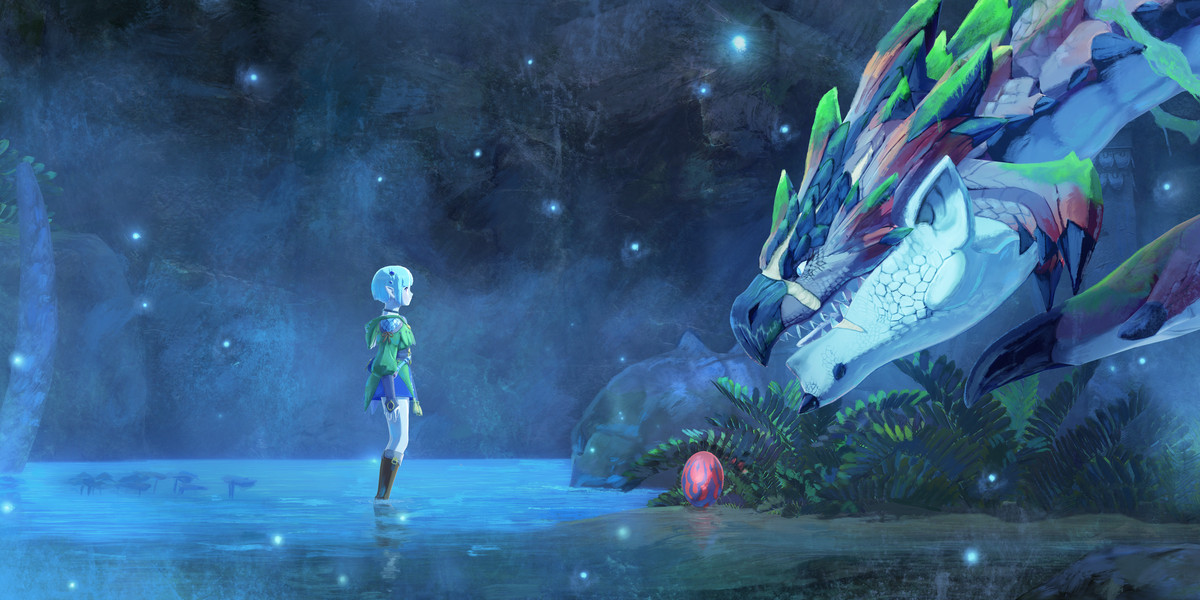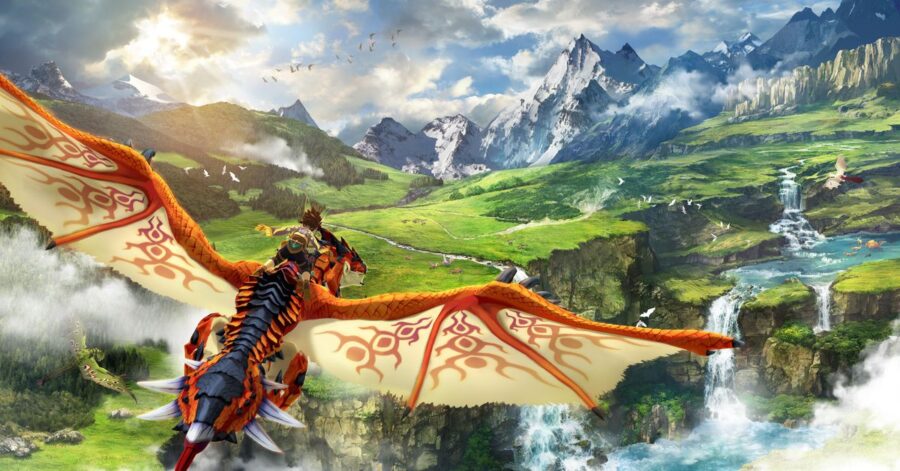Monster Hunter Stories 2: Wings of Ruin manages to pack all the odd quirks from the Monster Hunter series into a Pokémon-like turn-based RPG for Nintendo Switch and PC. It’s a bizarre combination, but it works.
I played the first few hours of Monster Hunter Stories 2: Wings of Ruins on Switch using a code from Capcom. But despite the game’s focus on story, the grind of Monster Hunter Stories 2: Wings of Ruin has been the most compelling and gripping aspect for me.
What is Monster Hunter Stories 2: Wings of Ruin

Wings of Ruin is a turn-based JRPG where I play as a Rider, whose village lives in (partial) harmony with the nearby monsters. In the early parts of the game’s first chapter, I take my giant greatsword and a borrowed Monstie — Stories’ term for domesticated monsters — and adventure out into the world. But I’m not hoofing it; I’m riding around on Ranmar, the Velocidrome I have on loan.
Ranmar and I, along with my teacher and her Velocidrome, roll around the area outside of my little village. I pick up special rocks and mushrooms, monster bones, bugs, and everything that isn’t nailed down; I’ve played a Monster Hunter game before, so I know I’ll need it all. I stuff all of this junk into my pockets, using some of it to make potions and the like, and continue on with my adventure.
Our little party runs into a group of Aptonoth, a basic monster. The game screen shatters in the classic turn-based style, and now we’re battling; there are four of us and three of them. I have three options when I attack: power, speed, and technical. I need to choose not only the best weapon for the job — swapping between blunt, sharp, and piercing weapons depending on my prey — but also the type of attack.
Combat operates like rock-paper-scissors, and I need to select the best move to use against whatever monster is targeting me. If one of the Aptonoth is targeting me with a power attack, I’ll need to choose speed. When our battle plays out, we’ll go into “head-to-head” mode. Because speed beats power, I win the duel, deal major damage to my opponent, and only get a few bumps. Speed beats power, power beats technical, and technical beats speed.
My Monstie, Ranmar, does his own thing. I can only determine what moves my Monstie makes by spending Kinship meter — which I earn by performing well in battle — or by trading it out for a monster that favors a different attack flavor. Ranmar is a speed monster, but something like a Pukei-Pukei is more technical. My teacher and her Monstie are completely on their own, outside of my control. I can control my Rider, which monster I have by my side, and that’s it.
As we battle, my Monstie and I are strengthening our bond. With our Kinship meter maxed out, I hop on its back and we combine our strength to deliver a powerful blow.
When the battle is over, I’ve strengthened my relationship with one monster and ended the lives of a couple others. We collect some XP for the entire party and I nab some monster parts that I’ll need later. Had this been a battle inside a monster’s den, I would’ve collected an egg that I could hatch back in town, adding to my roster.
It’s an elaborate but satisfying grind

So far, Monster Hunter Stories 2: Wings of Ruin has kept a similar loop to the mainline games. I start out in town, talking to our village elder, crafting some new gear, and picking up side quests. I get a bit of a story and then head out to hunt some monsters. Occasionally, my allies will interrupt our mission with some light dialogue, but the actual grind is fairly mindless, requiring just enough brain power to play power-speed-technical with the monsters I run into.
Mindless may not be the kindest term, but I mean it in the most positive sense. Going out to hunt an easy monster to pick up some extra pieces or complete a side quest is also mindless in Monster Hunter Rise, but that’s why I play it. I’m a big fan of consuming other media while I play my games, and Monster Hunter Stories 2 has become the perfect catalyst for TV-time and podcasts because that grind is mindless.
I spend a bulk of my time in Wings of Ruin collecting garbage off the floor, running through monster dens looking for eggs, and engaging in turn-based battles with the same monsters over and over again. These outings can last thirty minutes or more, and I rarely run into any key story developments outside of town. As long as I keep my remote or phone nearby, I can quickly pause whatever I’m listening to or watching in favor of the game’s story.
This isn’t a feature I expected from a game with “stories” in the damn title, but I welcome it nonetheless. I typically don’t consume other media while I’m playing story-based games like the Mass Effect: Legendary Edition or the new Yuffie DLC for Final Fantasy 7: Remake. I don’t want to miss the story bits I crave. But when games like Monster Hunter Stories 2 make such a big distinction between “story time” and “grinding time,” it really frees me up to catch up on a new show or rewatch something I love.
I don’t know how engaging Wings of Ruin’s story or combat will stay over its presumably lengthy campaign — although battles with bigger monsters do seem like they’ll become more complex over time. But through the game’s first chapter, I was just happy to have something fun to play while I watched my stories on TV.
Capcom will release Monster Hunter Stories 2: Wings of Ruin for the Nintendo Switch and Steam on July 9.
Polygon – All
Source link
Related Post:
- New Monster Hunter Stories 2: Wings Of Ruin Story Trailer Sets The Scene
- Monster Hunter Stories 2: Wings of Ruin Review (Switch)
- Monster Hunter Stories 2: Wings of Ruin Review
- Monster Hunter Stories 2: Wings of Ruin ships 1 million units worldwide
- Monster Hunter Stories 2: Wings of Ruin – 15 Things You Need To Know Before You Buy
- Monster Hunter Stories 2: Wings of Ruin demo now available
- Summer Game Fest 2024: Monster Hunter Stories 2: Wings of Ruin trailer
- Monster Hunter Stories 2: Wings of Ruin – Avinia trailer
- Monster Hunter Stories 2: Wings Of Ruin Demo Lands Soon On Switch
- Monster Hunter Stories 2: Wings of Ruin Review – The Final Verdict
